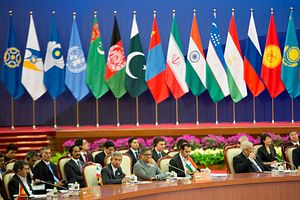
Future of Shanghai Cooperation Organization
Abdul Basit
The eight-member Shanghai Cooperation Organization, established in 2001, may atrophy in the years to come like the South Asian Organization for Cooperation (SAARC) and the Economic Cooperation Organization (ECO).
My fundamental argument is that regional or transregional organizations in most cases fail to deliver if bilateral relations of its key member states remain rickety and unpredictable. SCO cannot progress and realize its objectives in an environment of tension and conflict between China and India on the one hand and India and Pakistan on the other.
India has regretted to participate in the ongoing SCO military exercises “Kavkaz 2020” hosted by Russia, which started on Sept. 15 and will conclude on Sept. 27. The major reason is its ongoing border standoff with China in the eastern Ladakh region, in which 20 Indian soldiers have already lost their lives. Though the foreign ministers of the two countries have met in Moscow recently on the sidelines of the SCO foreign ministerial conclave, and agreed on a five-point formula to de-escalate tensions, there are still no signs of disengagement at the Line of Actual Control. Accusations and counter-accusations of not adhering to the agreed code of conduct continue with no concrete solution in sight.
Similarly, India’s National Security Adviser, Ajit Doval, left the virtual meeting of the SCO national security advisers in protest against Pakistan displaying at the back of its head of delegation a new political map that shows the disputed region of Jammu and Kashmir as a part of Pakistan. India also issued a new political map showing the entire Jammu and Kashmir as its own territory in November last year, after the unconstitutional Reorganization of Jammu and Kashmir Act came into effect in October. India contended that by displaying the new map even in the background, Pakistan had transgressed the SCO charter that bars its member states from bringing up bilateral issues to the forum.
SCO will likely face the fate of SAARC should India continue to be a member of this transregional organization. And, it will never quit the SCO itself as its presence serves the purpose of not letting the organization grow in jive with US strategic interests. China and Russia may now be regretting the decision to reincarnate Shanghai Five and moving it beyond Central Asia.
It thus beggars belief that active bilateral disputes can be put on the backburner and all member states feign normalcy and foster cooperative multilateral engagement. When there is deep bilateral mistrust, organizations such as the SCO usually become occasions for meetings on the margins and breaking bilateral gridlocks. Focus shifts from deliberating meaningfully on organizational agenda to ratcheting down bilateral tensions.
Take the example of SAARC that was founded in 1985. It has now literally become hostage to Pakistan-India conflict, stymieing regional economic cooperation, connectivity and integration. So much so that even convening the annual SAARC summit has become itself a daunting challenge. For instance, the last summit that was scheduled to take place in Islamabad in November 2016 could not be held as India refused to attend following the Uri attack in September in 2016, in which around 20 Indian security personnel were killed. And that was not the first time. In the past, too, many annual summits were cancelled primarily because of India’s bilateral problems with Pakistan and other neighbors, including Sri Lanka and the Maldives.
Similarly, many SAARC conventions and agreements, like the one on counterterrorism, that came into effect during the past three decades have been rendered almost dormant for there has hardly been any collective resolve to move beyond bilateral disputes and mutual security concerns. Rather, there has been the tendency to scrap even existing arrangements as was done by India in the wake of the Pulwama attack in February 2019 by revoking the Most-Favored Nation status that was given to Pakistan in 1996. Following India’s decision to stripping Kashmir of its special status on Aug. 5, 2019, Pakistan not only downgraded its diplomatic relations with India but also suspended bilateral trade indefinitely.
SCO’s parent organization Shanghai Five was formed in 1996. Its members were China, Russia and three Central Asian states of Kazakhstan, Kyrgyzstan, and Tajikistan. Uzbekistan joined the group when it became SCO in 2001. Pakistan and India were made full members concomitantly in 2017. Since its inception, it has been regularly holding its heads of state and government meetings as well as ministerial meetings. It has also established the Regional Anti-Terrorism Structure with its secretariat in Tashkent, Uzbekistan in June 2002.
Interestingly, it is not only intra-SCO disputes but also global strategic divergences that may be adversely impacting the organization. Clearly, India is gradually moving toward the US, which under President Donald Trump, considers China and Russia as major threats to its interests across the world. The US-India strategic partnership, though still at the nascent stage, can evolve into a huge irritant within the SCO in the years ahead. India will find it increasingly difficult to have its cake and eat it too. It cannot pretend to be a friend of Russia and China while augmenting its strategic relations with the US.
On the other hand, Russia may be required to revisit its relations with India, and whether India’s membership of the SCO is beneficial or a burden. Prospects look dismayingly slim of India resolving its long-standing disputes with both China and Pakistan in the foreseeable future.
In short, the SCO will likely face the fate of SAARC should India continue to be a member of this transregional organization. And, it will never quit the SCO itself as its presence serves the purpose of not letting the organization grow in jive with US strategic interests. China and Russia may now be regretting the decision to reincarnate Shanghai Five and moving it beyond Central Asia.
Abdul Basit is the president of Pakistan Institute for Conflict and Security Studies. He was previously Pakistan’s ambassador to Germany and Pakistan’s High Commissioner to India.
